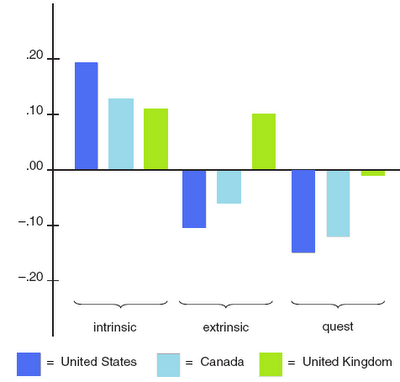The previous post took a look at some recent research on how competition for mates affects how religious people say they are. When a group of students in the US were subtly reminded that there’s a lot of competition for potential mates, they responded by claiming to be more religious. One potential explanation for this is simply that being religious is seen as socially desirable.
If this were true, then you would expect that people who are inclined to ‘self enhance’ (i.e. paint a rather flattering portrait of themselves) are also more likely to say that they are religious. There have been a huge number of studies looking at this over the years (57 studies, in fact, totalling over 15,000 subjects), and Constantine Sedikides (at Southampton University in the UK) has just compiled the results into a mega-study.
The results confirm that religion is strongly correlated with socially desirable responding (i.e. the tendency to give answers about yourself that you think will make you look good). There are two kinds of socially desirable responding – self deception (i.e. subconscious) and image manipulation (i.e. consciously talking yourself up).
Overall, image manipulation, but not self-deception, was correlated with religion.
Sedikides was able to look at the the two fundamental aspects of religion (well, as it is understood in the Western World, at least) – extrinsic and intrinsic religion. Extrinsic religion is basically the externalised expression of religion, whereas intrinsic religion is the internalised beliefs.
Now, you might think that extrinsic religion would be closely linked to image manipulation, but you’d be wrong. In fact, both self deception and image manipulation were linked to higher intrinsic religiosity, while extrinsic religion was actually linked to less of both kinds of self-enhancement.
 A fascinating result, but it becomes even more interesting when you break it down at the national level. As you can see from the graph, the strongest effect of religion is in the USA.
A fascinating result, but it becomes even more interesting when you break it down at the national level. As you can see from the graph, the strongest effect of religion is in the USA.
In Canada and the UK, the link between intrinsic religion and self-enhancement is smaller.
Bizarrely, in the UK, self-enhancement is linked to more extrinsic religion (unlike the USA and Canada, where self-enhancers are actually less likely to claim extrinsic religiosity.
Sedikides speculates that this is down to the different role of religion in the USA compared with Canada and – especially – the UK.
In the USA, most people are religious and it’s common for people to frown upon those who are only religious for what could be seen as superficial reasons. Self-enhancers respond by saying that they are intrinsic believers, but that they are not extrinsically religious. (Compare this with the study last year that showed people in the US believe the religious to be healthier, happier, and more normal than they actually are)
In the UK, religion is a minority pursuit, and subject to ridicule. Self-enhancers respond by saying that they don’t really take the beliefs too seriously, but they are in it for the community and social side.
Sedikides also looked at the difference between secular universities in the USA and Christian ones, and found something similar. Self-enhancers at Christian Universities report high intrinsic religion, and low extrinsic religion. This effect is muted at secular universities (especially for extrinsic religion).
Now, if you’ve read this far you are probably wondering why all this talk of cause and effect, given that all the data are correlational? Well, Sedikides has an answer. He points out that it’s well known that people use a wide variety of means to satisfy their self-enhancement motives – so you would expect them to use religion as well. What’s more, self-enhancement is a very basic psychological structure, whereas religion is primarily a cultural adaptation.
__________________________________________________________________________![]()
Sedikides, C., & Gebauer, J. (2009). Religiosity as Self-Enhancement: A Meta-Analysis of the Relation Between Socially Desirable Responding and Religiosity Personality and Social Psychology Review DOI: 10.1177/1088868309351002
 This article by Tom Rees was first published on Epiphenom. It is licensed under Creative Commons.
This article by Tom Rees was first published on Epiphenom. It is licensed under Creative Commons.













